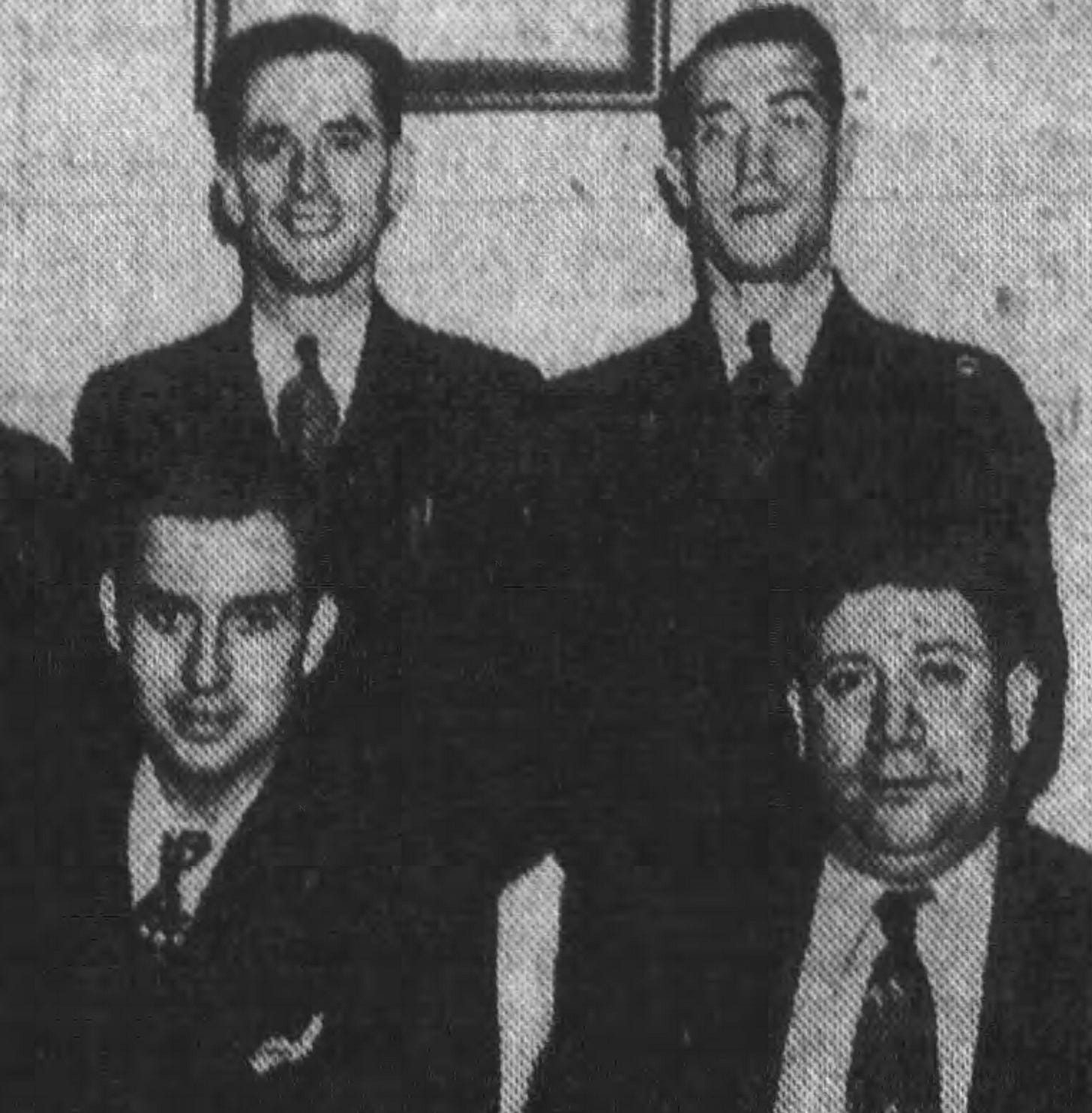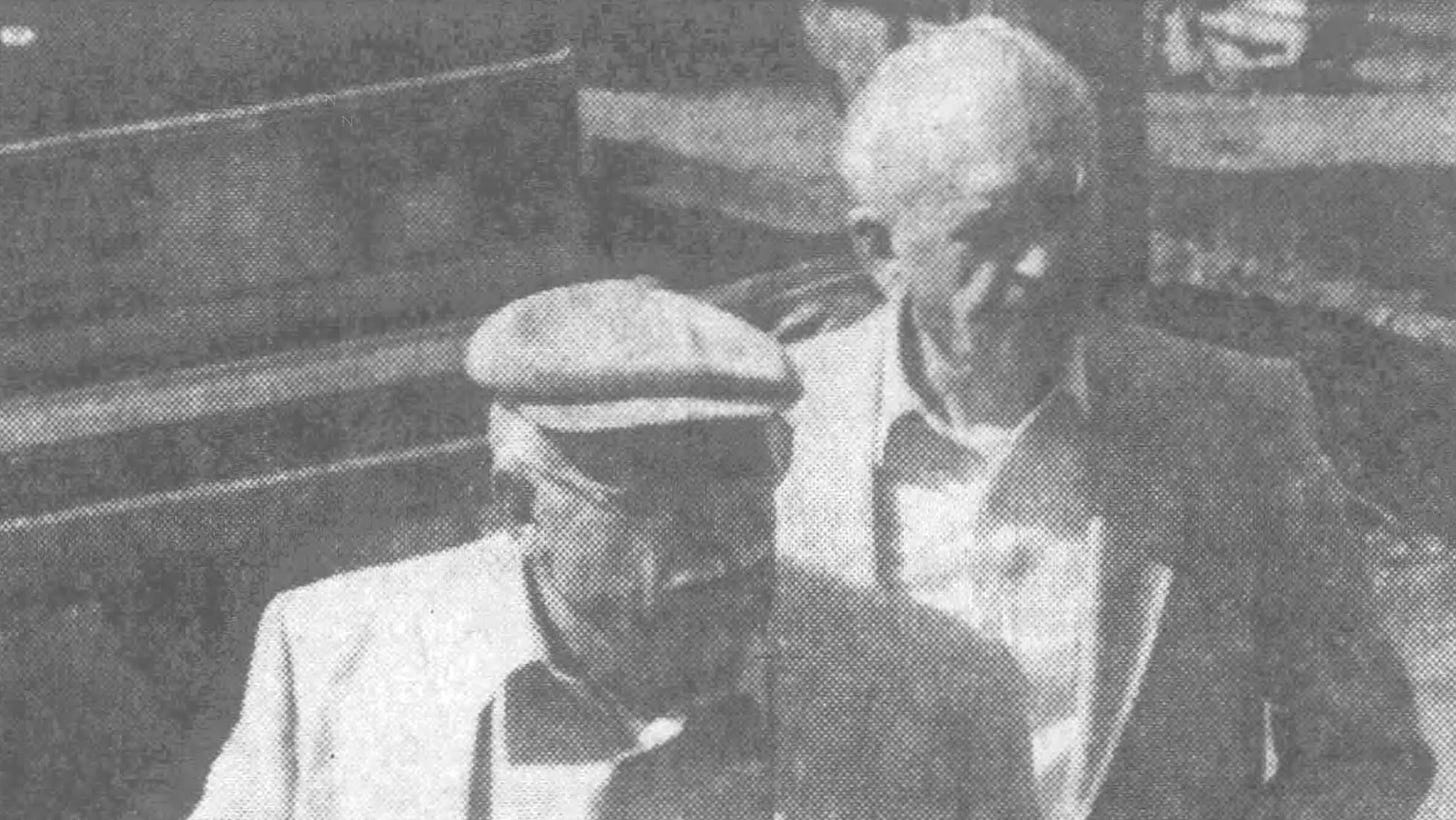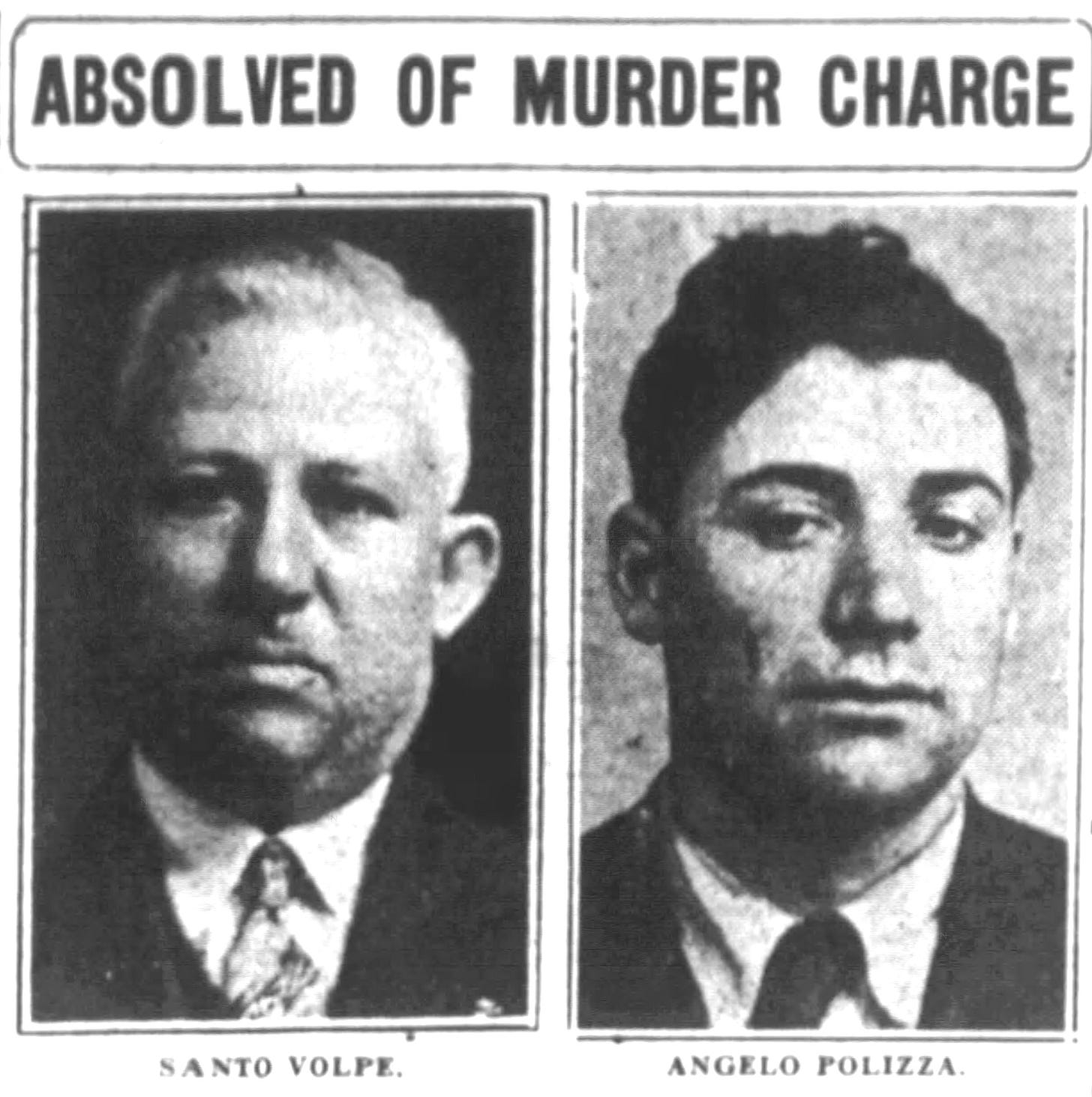Michele Polizzi (1862-1912) never reached American soil, living and dying in San Cataldo, Caltanissetta. His Wife, Serafina Calabrese (c.1869-1949) and their children all made the journey with some having several ties to LCN.
The children were:
Marianna Polizzi - 1885-1956
Cataldo Polizzi - 1893-1952
Salvatore Polizzi - 1896-1925
Angelo Polizzi - 1899-1957
Angela Polizzi - 1903-1989 (no LCN ties)
Giuseppe Polizzi - 1906-1981
Marianna (Mary) Polizzi
Marianna immigrated from San Cataldo in 1907, intending to reach husband Michele Ferrari/o of Main Street, Pittston. She was widowed by 1930, leaving her to raise six children. She tragically died in 1956, whilst picking coal. The Times Leader, January 6th, wrote that a witness reported that, “Mrs Ferrari was reaching for coal between two lokie cars of a string of 20 cars on a slope. The empty lokie cars were moved and Mrs Ferrari was dragged between the cars for about 33 feet.”
Pallbearers for her funeral included three nephews, all named Michael Pollizi (presumably one was the Detroit LCN member of this name, son of Angelo), Joseph Barbara, Emanuel Zicari and (Pittston Boss at this time) Russell Bufalino. The calibre of pallbearer was in no doubt due to her brother Angelo and his connections.
Cataldo Polizzi
Cataldo immigrated to Dunmore in 1913. Three year later, he is arrested as an accessory after the fact in the murder case of a Giuseppe Pasquale. His Father-in-law, Cataldo Guarnieri was the murderer; Cataldo Polizzi was excused of aiding his Father-in-law of escaping. Cataldo Polizzi denied any knowledge of the crime and explained he knew nothing of the murderer’s whereabouts. He was later released.
By 1930, Cataldo Polizzi was President of the Dunmore San Cataldo Society. This was followed in 1941 with him being named an Officer of the Young Men’s Progressive club of the Second Ward, Dunmore (a group that included LCN member Casper “Cappy” Guimento as part of its ‘executive committee’).
In 1940, Polizzi was elected as Councilman for the Second Ward of Dunmore.
Cataldo’s 1942 draft registration details his employer as the Volpe Coal Co. of Pittston. This is former Pittston Boss Santo Volpe’s company. In his obituary, it states that prior to 1940, he was a member of the United Mine Workers of America Grievance Committee for Pennsylvania Coal company employees.
In 1950, he is named with brothers Angelo and Joseph, as ‘mafia suspects’ in the Texas Crime Investigating Committee’s report on the History of the Mafia.
Cataldo Polizzi died in 1952 after a brief illness.
Salvatore Polizzi
Salvatore immigrated in 1913, aged 17, with an intention to join brother-in-law Michele Ferraro in Mayfield, Pennsylvania. By 1917 he was working for the Penn Coal Company. After serving his country, he lived in Dunmore, married Laura Guimento (sister of LCN member Casper) before dying young, in 1925. His daughter would marry the son of LCN member Louis Consagra.
Angelo Polizzi
The most prolific of the brothers was Angelo. Born in San Cataldo in 1899, he immigrating in 1915 as Michelangelo, with a destination of brother Cataldo in Dunmore.
From July 1917-February 1919, Angelo served in the First World War. He was discharged from duty; a February 1919 newspaper report names him in a list of those ‘wounded slightly.’ He was naturalized in Scranton in October 1919, with his residence listed as 247 Elm Street, Dunmore. The same address in 1919 was listed as his brother Salvatore’s home. Cataldo also lived here as of 1923.
In August of 1920, Angelo was involved in a gangland incident in Detroit’s Little Italy. At 9:30 on the morning of the 11th August, he and a Giusepe Manzello were shot by automobile gunmen.
The Detroit Free Press described the shooting in this sequence of events:
“[Angelo Meli] came to their house, 121 St. Aubin Avenue, Wednesday morning. He breakfasted with them. Following this, he asked his hosts to accompany him to a nearby garage. With Meli in the center, the three walked south on St. Aubin Avenue to Larned Street, turning east on Larned. The gunman’s automobile approached them as they were passing No. 539. The occupants opened fire, but the aim was wild.
Manzello and Pollizi turned and fled. Shooting continued, and Manzello fell with seven shots in his back, and Polizzi with five in his back. Meli, according to detectives did not run; they said they will undertake to prove he fired the shots that wounded the fleeing men.
The shots from the automobile which sped on, went high, they said. Ten bullets well up on the sides of houses in the neighbourhood support their conclusions.
When questioned, Manzello said, “he saw the shotgun poking out of the auto, but could not say who did the shooting, not even whether it was a man or a woman. He could not tell what kind of car it was.” Angelo Polizzi stated, “two shots were fired, one of them accounting for Manzello and the other wounding himself. When the two shots were fired, the third man, who was on the inside and furthest away from the auto, ran between the houses and escaped” In response to the implication that Angelo Meli had played a part in the shooting, Polizzi replied, “He came from the same town in Italy as we did, and he was like a brother.” LCN members Angelo and Frank Meli, like Angelo Polizzi immigrated to Dunmore from San Cataldo.
As only two shots were fired, and the men had 15 wounds between them, the prosecutors office was satisfied the shooting had been done with shotguns. It was believed the shooting was completed by one man, and the victims knew his identity.
Newspapers reported the murder of Antonio Badalamenti (15:45, also 11th August), was connected to the shooting of Angelo Polizzi and Manzello. Suspects held in connection to the Badalamenti murder were James Baracco, Joseph Zerelli, Leonardo Cellura, Joseph DeManto, William Toco (‘Black Bill’ Tocco), John Mengone, Carlo Menzello (Manzello) and Vito Perraino. The connection between the two crimes was made when it was discovered that Joseph Zerelli (future Detroit LCN Boss) lived at the same residence of 121 St. Aubin Avenue, as the morning shooting victims, Angelo Polizzi and Giuseppe Manzello.
In June 1921, Dunmore Police got a tip from Detroit authorities that a Cadillac had been shipped from Detroit to Buffalo, where it was repainted maroon in preparation for a bank robbery or payroll hold-up. Local Police found the newly painted car in a garage, awaiting repairs and after surveying the area, spotted four men acting suspiciously. They were arrested and after searching them, three were found to be carrying revolvers, each with extra ammunition. The four men were: Angelo Polizzi, Detroit; Salvatore Cerrito, Pittston; George Pantano, Dunmore and Angelo Meli, Detroit. Clearly Polizzi was in contact with Dunmore-based criminals and was willing to travel back to his old town to commit crime. Three of the men told police they were on their way to a wedding celebration; this looked doubtful when a kit of burglars’ tools were found in the maroon car. A ‘Dunmore Italian’ posted the £1000 bail, Polizzi left town and the bail was forfeited later that year. Newspapers reported the men were planning to rob the Pennsylvania Coal Co. Angelo’s brother Salvatore was working for the company as of 1917.
In August 1922, Angelo Polizzi applied for a passport with the intention of visiting relatives in Italy. Witness of application was future Detroit Boss, Cesare “Chester” LaMare, stating he had known Angelo since 1919. Whilst in Italy (presumably, San Cataldo) Angelo married Assunta Chinnici.
Polizzi arrived back in the port of New York in June 1923. As eldest son- and future Detroit LCN member Michele (Michael) Pollizi (1924-1997) was born in January of 1924; it can be assumed he was conceived during Angelo’s visit to his homeland. Angelo’s address as of 1923 is listed as 2952 Senolem (Seminole?) Avenue, Detroit.
Immigration records show he traveled again to Italy and returned in 1927, listing 247 Elm Street, Dunmore as his residence. He was most probably still residing in Detroit, as in 1928 when his Wife and four-year old son Michele immigrated from San Cataldo to join him, the address they were heading for, was 11800 Longview Avenue, Detroit. This is the same address as Frank Meli’s wife and children were heading to when they immigrated in 1929.
In 1929, Angelo is a pallbearer for ‘person of interest’ - Calogero Cancellieri, a mining contractor from San Cataldo.
By 1930, the family, now living on 11743 Longview Avenue, Detroit, had been joined by Angelo’s brother Joseph. Both brothers occupation was listed as coal miner.
Pittsburgh Boss, John Bazzano was brutally murdered in New York, August 1932. Fourteen men were arrested, charged with murder including Santo Volpe and Angelo Polizzi. After being released for lack of evidence, Polizzi was immediately rearrested for disorderly conduct and as a ‘public enemy’.
In newspaper articles and an FBI file, Polizzi’s address is reported as 285 Elm Street, Dunmore. As of two years earlier, Angelo’s Mother, remarried, lived at this residence along with her widowed daughter-in-law, Laura Guimento and her family. A year later another newspaper article has Angelo still residing at this address. The building was also home for brothers Joseph in 1932, and Cataldo as early as 1919.
In 1933, Hanover Township racketeer Samuel Wichner’s body was discovered in the back of his abandoned Ford coupe, having been beaten and strangled. Familiar names were linked to his death. An FBI file records that “On 2/21/33 Angelo Polizzi was arrested at Recreastional Center of Louis Pagnotti after having just returned from New York accompanied by Joe Barbara. Barbara was arrested the same date.” Santo Volpe was asked to appear for questioning. Another FBI files states that, “victim allegedly lured to the home of [Joseph Barbara], Santo Volpe and Angelo Polizzi, who were to be his silent partners in a new bootlegging venture. He had informed his wife he had been to [Barbara’s] home the previous night and was instructed by [Barbara] to return at 9:30 P.M. the following night and not let anyone know where he was going, not even his wife.”
Following the discovery of his body, Wichner’ wife informed State Police that he had told her of his plans to “see Volpe, Polizzi, and man known as “Sam.”
A witness reported that when Wichner’s car was abandoned in Scranton, two men stepped into a black Buick occupied by two other men who had followed them. The witness was unable to identify Polizzi or Barbara. Following their questioning, both Old Forge men were released.
Joseph Barbara appears to have had a strong friendship with Angelo Polizzi. In 1936, he is named as a guest at Angelo’s 37th suprise birthday party, reported in The Scranton Republican. Barbara is the only known LCN member at the event.
By 1937, several years after his brother Cataldo, Angelo Polizzi was President of Dunmore’s San Cataldo Society and by 1940 was living in Scranton.
In 1953, the New York State Liquor Authority attempted to put Joseph Barbara’s Endicott bottling company out of business due to a company stockholder and director, Pittston LCN member Salvatore Galante concealing a criminal record. One of the charges investigated was an alleged arrest in February 1944 related to a shooting in San Francisco. Galante included in his affidavit the following details, “On or about the month of February, 1944, I, in company with…Bufalino [Charles] a retired mine operator of Pittston, Pa., by whom I had been employed many years ago, (and with [John] Sciandra and [Angelo] Polizzi) took a vacation trip to California… I think it was about the second day after we arrived at the San Francisco Hotel that the police came to the hotel. They were investigating some crime. They searched our rooms. Of course, they didn’t find anything. They took us to the police station to question us….They mentioned the names of some San Francisco ‘characters’ and asked us whether we were acquainted with any of them…we were ‘suspects.’
Between 1944-45, Pollizi lent Joseph Barbara $15,000 to be used as working capital for Barbara’s Canada Dry Bottling Co. Other lenders were LCN members Santo Volpe, Charles Bufalino, Louis Consagra and possible member Louis Pagnotti.
A 1950 newspaper article concerning Angelo Polizzi and this period contains quotes from Santo Volpe stating that Polizzi “was in business with me from 1934 to 1947, in charge of a stripping operation [coal mining, not a Bada Bing type enterprise] in the Tamaqua area.” Their shared enterprises included the Volpe Construction Co., The Volpe Coal Co., and the Pittston Excavating Co. Volpe goes on to say, “In 1946, Mr Polizzi suffered a heart attack and was unable to continue his activities here. He sold out his business interests and moved to Detroit, where his son had gone into business. I last heard from the family last week, when Mrs Polizzi told me by telephone that her husband was seriously ill of a heart ailment there, and was under an oxygen tent.”
Angelo’s son Michael married Angeline Priziola, a daughter of John “Papa John” Priziola in 1947. With this family bond, Angelo was linked one way or another to four of the five ‘Dons’ sat at the top of the 1963 Detroit ‘Valachi Chart.’
In 1950, Angelo is listed as a ‘mafia suspect’ in the Texas Crime Investigating Committee’s report on the History of the Mafia. The detailed report states, “This subject is an extremely important and influential member of the Grand Council of the International Mafia Society and is head of the state organization in Michigan. Polizzi came to Detroit, Michigan about two years ago and replaced Pete Licavoli, who formerly occupied this position, when the latter purchased a large ranch near Tuscon, Arizona. Polizzi, is closely associated with the top ranking members of the organization throughout the United States and Italy and has made several trips abroad in recent years. During the twenties, he lived in Detroit, Michigan. He then moved to New York for a short time where he was associated with such important mafia members as Guiseppe (Joe) Traina and Albert Anastasia. During the early thirties, Polizzi moved to Northeastern Pennsylvania, where he soon became recognised leader among the mafia and Sicilian elements. While residing in Pennsylvania, he controlled the largest illicit liquor enterprise in the area during national prohibition an in addition had diversified legitimate business interests which include the following: coal mine operations at Pittston, Pa., Old Forge and Forest City, Pa., a construction business in Pittston, Pa.; and a brewery at Lockport, Pennsylvania. The subject has been arrested on a number of occasions on such charges as carrying concealed weapons, murder and general investigation and his criminal activities are known to have included a much larger category.” Whilst some of the details presented may elevate Angelo Polizzi’s actual position in the Detroit LCN, it does demonstrate and summarise his coloured and vastly-connected past.
An FBI file detailing ‘LCN Activities in Upstate Pennsylvania area’ states, “in 1955 [Russell] Bufalino was the immediate supervisor of John Parrino and that Parrino had the following persons directly under him: John Salvo, Sam Cometa, Rosario Montanto, Angelo Polizzi, William Medico, Angelo Medico, Louis Consagra, Joseph Contessa, Joseph Scalleat [and] possibly Angelo Sciandra.” This information could either be dated, as Polizzi had by now been living in Detroit for several years, or, it could mean he was a remote Pittston member. One error is the inclusion of Joseph Scalleat. Brother Albert was the Pittston member.
A 1958 FBI interview with Pittston member William Medico, gives further information of Polizzi’s friendship with Joseph Barbara. “Medico advised that during the summer of 1957, date not recalled, he arranged for the transportation of Angelo Polizzi and his wife from Avoca, PA., to Endicott, N.Y., using the plane of Louis Pagnotti, Sr. He said that on the flight, he and Russell Bufalino travelled to Endicott in Pagnotti’s plane with Angelo Polizzi and his wife. Medico said that Polizzi and Barbara were old friends and that the trip made by Polizzi…was strictly social in nature. He explained that Polizzi was ill at the time.”
Later in 1957, Angelo Polizzi died.
Giuseppe Polizzi
The youngest of the Polizzi siblings, Giuseppe was born in 1906, immigrated with his mother in 1920, heading for brother Salvatore and by 1930 was living with brother Angelo in Detroit. By 1940, he was residing in Dunmore and working for the Volpe Coal Company. He, like brothers, Angelo and Cataldo was named a ‘mafia suspect’ in 1950. However, there is little evidence to substantiate this claim.
He died in 1981.











